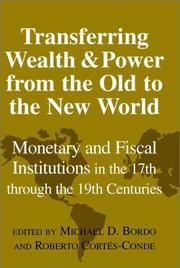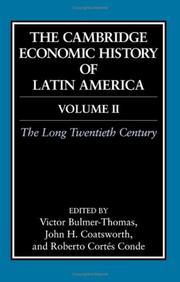| Listing 1 - 6 of 6 |
Sort by
|
Book
ISBN: 9780521882323 9780511551819 9781107617780 0511479786 9780511479786 9780511480584 051148058X 052188232X 1107199999 9786612001444 0511551819 0511477376 0511475934 0511478895 1107617782 9780511477379 Year: 2009 Publisher: New York : Cambridge University Press,
Abstract | Keywords | Export | Availability | Bookmark
 Loading...
Loading...Choose an application
- Reference Manager
- EndNote
- RefWorks (Direct export to RefWorks)
In this book, Roberto Cortés Conde describes and explains the decline of the Argentine economy in the twentieth century, its evolution, and its consequences. At the beginning of the century, the economy grew at a sustained rate, a modern transport system united the country, a massive influx of immigrants populated the land, and education expanded, leading to a dramatic fall in illiteracy. However, by the second half of the century, growth not only stalled, but a dramatic reversal occurred, and the perspectives in the median and long term turned negative, and growth eventually collapsed. This work of historical analysis defines the most important problems faced by the Argentine economy. Some of these problems were fundamental, while others occurred without being properly considered, but in their entirety, Cortés Conde demonstrates how they had a deleterious effect on the country.
331.31 --- AR / Argentina - Argentinië - Argentine --- Economisch beleid --- Argentina --- Argenṭinah --- Argenṭine --- Argentine Confederation (1851-1861) --- Argentine Nation --- Argentine Republic --- Aruzenchin --- Confederación Argentina (1851-1861) --- Nación Argentina --- República Argentina --- アルゼンチン --- Provincias Unidas del Río de la Plata --- Economic conditions --- Arts and Humanities --- History
Book
Year: 1974 Publisher: Buenos Aires : Paídos,
Abstract | Keywords | Export | Availability | Bookmark
 Loading...
Loading...Choose an application
- Reference Manager
- EndNote
- RefWorks (Direct export to RefWorks)
Book
Year: 1974 Publisher: Buenos Aires Paidós
Abstract | Keywords | Export | Availability | Bookmark
 Loading...
Loading...Choose an application
- Reference Manager
- EndNote
- RefWorks (Direct export to RefWorks)

ISBN: 0521773059 0521027276 0511664796 9780521773058 9780511664793 9780521027274 Year: 2001 Volume: *2 Publisher: Cambridge: Cambridge university press,
Abstract | Keywords | Export | Availability | Bookmark
 Loading...
Loading...Choose an application
- Reference Manager
- EndNote
- RefWorks (Direct export to RefWorks)
This book contains a collection of essays comparing the evolution of the fiscal and monetary regimes of the Old World colonial powers - England, France, Spain, Portugal and the Netherlands - from the seventeenth to the nineteenth centuries with the experiences of several of their former colonies in the New World of the Americas: the United States, Canada, Mexico, Colombia, Brazil and Argentina. The objective is to see how such fiscal and monetary institutions were modified or replaced by new ones. The case studies in the collection consider the experience of the colonies after they became independent countries; they examine the factors that allowed efficient fiscal institutions to develop in some countries, while in others such development turned out to be unsuccessful; and they consider why some governments were able to live within their means and provide public goods, while for others expenditures frequently exceeded revenue, often leading to fiscal crises.
Economic history --- Economische geschiedenis --- Geschiedenis [Economische ] --- Histoire économique --- History [Economic ] --- Economic History --- Monetary policy --- International economic relations --- History --- Europe --- Economic conditions --- AA / International- internationaal --- AR / Argentina - Argentinië - Argentine --- BR / Brazil - Brazilië - Brésil --- CA / Canada --- CO / Colombia - Colombie --- ES / Spain - Spanje - Espagne --- FR / France - Frankrijk --- GB / United Kingdom - Verenigd Koninkrijk - Royaume Uni --- MX / Mexico - Mexique --- NL / Netherlands - Nederland - Pays Bas --- PT / Portugal --- US / United States of America - USA - Verenigde Staten - Etats Unis --- 331.160 --- Financiële geschiedenis: algemeenheden. --- Fiscal policy --- History, Economic --- Economics --- Monetary management --- Economic policy --- Currency boards --- Money supply --- Tax policy --- Taxation --- Finance, Public --- Financiële geschiedenis: algemeenheden --- Government policy --- Economic conditions. --- Business, Economy and Management --- Economic history. --- History. --- Monetary policy - Europe - History --- International economic relations - History --- Europe - Economic conditions
Book
ISBN: 1316085732 1139053973 1280414340 0511161220 0511161670 0511160372 051131311X 0511160941 Year: 2006 Publisher: Cambridge ; New York, NY : Cambridge University Press,
Abstract | Keywords | Export | Availability | Bookmark
 Loading...
Loading...Choose an application
- Reference Manager
- EndNote
- RefWorks (Direct export to RefWorks)
Volume Two treats the 'long twentieth century' from the onset of modern economic growth to the present. It analyzes the principal dimensions of Latin America's first era of sustained economic growth from the last decades of the nineteenth century to 1930. It explores the era of inward-looking development from the 1930s to the collapse of import-substituting industrialization and the return to strategies of globalization in the 1980s. Finally, it looks at the long term trends in capital flows, agriculture and the environment.
Latin America --- Economic conditions --- Economic policy. --- Economic history. --- Economic conditions.

ISBN: 0521812895 9780521812894 0521812909 9780521812900 0521857163 9780521857161 9781139053945 9781139053976 Year: 2006
Abstract | Keywords | Export | Availability | Bookmark
 Loading...
Loading...Choose an application
- Reference Manager
- EndNote
- RefWorks (Direct export to RefWorks)
| Listing 1 - 6 of 6 |
Sort by
|

 Search
Search Feedback
Feedback About UniCat
About UniCat  Help
Help News
News